by Sharon Rondeau

(Apr. 11, 2023) — On Saturday, April 8, journalist Jordan Schachtel reported on his Substack, “The Dossier,” that Substack co-founder Chris Best denied Twitter CEO Elon Musk’s accusation earlier that day that Substack had attempted to “download a massive portion of the Twitter database to bootstrap their Twitter clone” after Substack writers discovered that links to their work were dysfunctional on Twitter.
The new Substack sub-platform to which Musk referred was recently introduced to the public as “Notes” and intended for authors to post short segments of their work to build further engagement.
Musk added to his allegation that Substack’s perceived unethical conduct resulted in Twitter’s position that its “IP address is obviously un-trusted.”
The conflict between the two companies arose Thursday, The Verge reported, with Substack pledging to look into Twitter’s blocking of writers’ links to the platform.
A statement from Substack’s three co-founders provided to the outlet Friday reads:
We’re disappointed that Twitter has chosen to restrict writers’ ability to share their work. Writers deserve the freedom to share links to Substack or anywhere else. This abrupt change is a reminder of why writers deserve a model that puts them in charge, that rewards great work with money, and that protects the free press and free speech. Their livelihoods should not be tied to platforms where they don’t own their relationship with their audience, and where the rules can change on a whim.
Also on Friday, Best wrote on his Twitter timeline that “This morning Twitter started throttling links to our platform.”

“We hope this action was made in error and is only temporary, because writers deserve the freedom to share whatever links they want,” Best continued. “But this is bigger than Twitter. It shows why it’s so important for writers to own their relationship with their audience…”
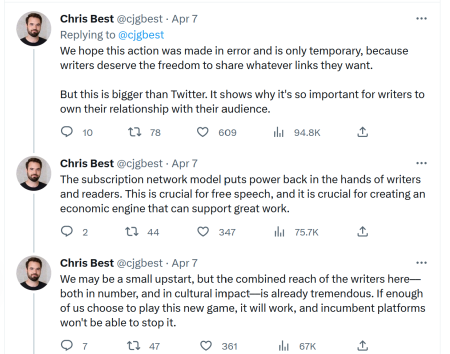
The same day, “Racket News” editor Matt Taibbi, also the most-frequently-published “Twitter Files” journalist invited by Musk himself to review Twitter communications and documents generated prior to Musk’s acquisition of the platform in October, reported Twitter was preventing him from posting links to his work on Substack.
After asking “what was going on,” Taibbi wrote, Twitter indicated it “is upset about the new Substack Notes feature, which they see as a hostile rival.”
“When I asked how I was supposed to market my work, I was given the option of posting my articles on Twitter instead of Substack,” Taibbi added.
He would, then, “leave Twitter,” following some downtime to spend with his family, Taibbi concluded Friday’s post.
In early January, Taibbi posted on Substack the entirety of his “Twitter Files” reporting to date, including “links and a glossary.”
On Saturday, Schachtel expounded:
Over the last couple days, Elon Musk, who came to Twitter promising to be guided by the principle of free speech, has imposed a Great Firewall upon Substack. He has blocked any interactions with any and all Substack posts, and has censored Substack’s account and mentions of Substack on Twitter. He also added a warning label to Substack links.
He then provided a screenshot of a Twitter-generated “warning” message in response to Schachtel’s attempt to post links to his Substack columns, albeit with an option to “ignore” the warning and “continue.”
Clarifying that Twitter had not posted an official statement on the Substack issue, Schachtel reposted a response Musk issued to Bret Weinstein, former Evergreen State College (WA) professor and host of the “Dark Horse” podcast, in which Musk made his several claims.
To Musk’s assertion that he is or was “an employee of Substack,” Taibbi responded Sunday from vacation: “I’ve never been a Substack employee. I have my own company, but I’m employed by subscribers. I have some loyalty to Substack, a company that’s always treated me well, and whose original Substack Pro offer made it possible for a person with kids like me to leave mainstream journalism.”
Musk was severely criticized for what many users viewed as his betrayal of the principle of free speech for which he advocated both before and after purchasing Twitter for approximately $44 billion.
In his article Saturday, Schachtel posted Best’s response to Musk, which began with, “None of this is true.”

The statement was reportedly posted on Substack Notes, although after a thorough search The Post & Email was unable to locate it.
At the time Best claimed “Substack links have been severely throttled on Twitter” and that Substack had “used the Twitter API, for years, to help writers. We believe we’re in compliance with the terms, but if they have any specific concerns we would love to know about them! We’d be happy to address any issues.”
Wikipedia defines “API” (application programming interface) as “a way for two or more computer programs to communicate with each other. It is a type of software interface, offering a service to other pieces of software.[1]
Finally, Best reported that Taibbi “is not and has never been an employee of Substack.”
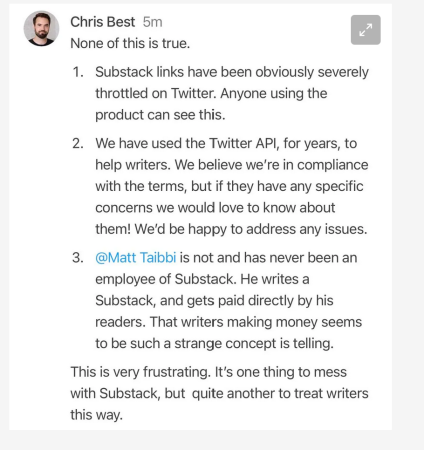
On Saturday evening, however, Best appeared to be “testing” whether Twitter’s blocking of Substack links remained in effect.
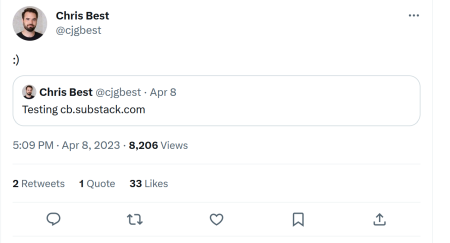
At 10:58 p.m. Saturday, a tweet from Substack appeared optimistic about a reconciliation between the two platforms:

A second tweet issued virtually simultaneously indicated the alleged “throttling” had ceased.
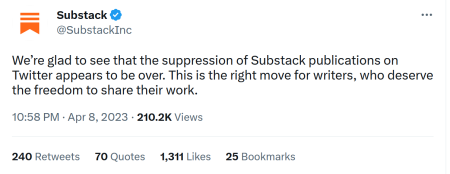
On Tuesday morning, Best promoted the launch of Substack Notes on Twitter as now being “available to everyone.”
In an opinion column Tuesday morning, Matt Novak of Forbes wrote, “Substack, a newsletter platform that allows writers to charge for subscriptions, launched its short-form content feature called Notes on Tuesday morning. And after a couple of days trying out Notes as part of a sneak peek, I finally understand why Twitter CEO Elon Musk apparently feels so threatened by the project.”
On Saturday, Novak, who maintains a Substack column, had written about the Musk/Substack conflict, reporting that Twitter did not respond meaningfully to his inquiry and that Best’s account was inaccessible on Twitter.
On Monday evening, Musk wrote in a response to three parties, one of whom is a “Twitter Files” reporter, that “Substack was temporarily categorized as ‘unsafe’ when we discovered that they were illegally downloading vast amounts of data to pre-populate their Twitter clone.”
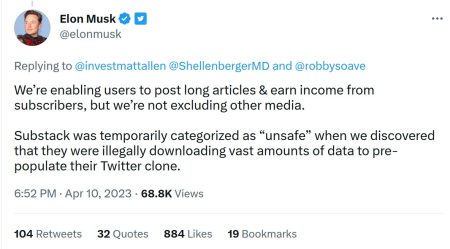
While numerous outlets pounced on the story as it erupted, few have updated their reporting to show that Best and Substack reported it resolved by Saturday night and that searches for the term “Substack,” apparently disabled over the weekend, now return proper results.
An exception, The Verge reported Tuesday morning in its coverage of the launch of Substack Notes:
Some big Substack creators have said they’d be moving to Notes, so Substack could see some traction if it becomes the only place you can read certain writers. That said, Twitter has already largely walked back its restrictions on Substack, so it’s possible some writers may choose to stay on Twitter even after last week’s shenanigans.

